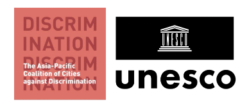Master class series
objective and activities
Launched by UNESCO in November 2019 as a global “training for trainers” initiative, the Master Class Series against Racism and Discriminations seeks to empower students to become youth champions in their own schools and communities and spread awareness on how to deconstruct the mechanisms underlying racism and discriminations. The Master Classes serve as dialogue spaces and peer learning forums among the young participants, the experts and resource persons, and the invited personalities, in order to openly discuss the taboos that corrode the social and moral fibre in societies.
Using a human rights-based approach, the courses address various topics related to inclusion and non-discrimination, such as racial discrimination, gender-based discrimination, rights of indigenous peoples, discrimination against persons with disabilities, inter alia. Depending on the regional and local contexts, the programme content and the curriculum of each Master Class are designed by UNESCO in collaboration with local partners and stakeholders.
In 2021 APCAD hosted a ‘Master Class Gwangju Series Launching Panel’ as an introductory session to prepare for the full launch of the Master class series at the World Human Rights City Forum 2022. Cities from Asia Pacific also participated in the first global Master Class held in Paris in 2022. The experience of Mongolia is reported here.
In 2022, Gwangju Metropolitan City, as the lead city of the UNESCO Asia Pacific Coalition of Cities Against Discrimination (UNESCO APCAD), organized the UNESCO Master Class Gwangju Series to foster the next generation of anti-discrimination leaders. Specifically, the Gwangju Series was designed under the theme of “Youth’s Action Against Online Discriminations”, focusing on the rapidly increasing online hate speech, which has been proven to become more severe during the COVID-19 pandemic. Namely, according to the results of the “Online Hate Speech Awareness Survey” conducted by the National Human Rights Commission of Korea in 2021, 59.5% of respondents answered, “hate and discrimination have increased in our society” since the outbreak of COVID-19. Moreover, compared to other age groups, teens and twenties were found to have a much higher chance of experiencing hate online.
